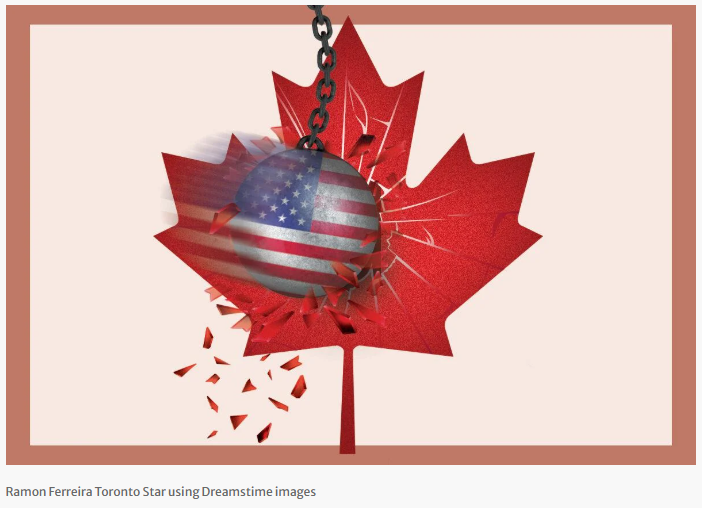By Ana Pereira | The Toronto Star
When U.S. President Donald Trump threatened to launch a full-blown trade war with its closest ally, many Canadians felt as if their best friend had suddenly turned around and stabbed them in the back.
Trump’s string of accusations, along with increasingly hostile suggestions that the U.S. annex Canada as “the 51st state,” have led many to pledge boycotts of American products. The majority of Canadians now support calling on the government to reduce our reliance on the U.S. as a trading partner, according to a recent poll by the Angus Reid Institute of more than 1,800 adults.
Patriotism aside, there are solid economic reasons why Canada might want to consider reducing trade with America, according to economists. Trump’s threats have introduced a major source of uncertainty in a decades-old trade partnership that saw Canada give up some of its independence in exchange for economic prosperity and stability.
It’s a relationship that has benefitted both economies, with nearly 80 per cent of Canadian exports currently ending up south of the border, but it was built on trust, and trade experts say that trust is now gone.
Is achieving a greater degree of economic independence from the U.S. really possible? Can we really undo decades of integration without seeing our economy crumble?
The Star spoke with economists, academics and other experts, including SCP CEO Matthew Mendelsohn, about how the country should best navigate this new era of Trump’s isolationism, and found there are realistic steps we can take to reduce our dependence on the States.

Share with a friend
Related reading
Watch the video: Why would a company sell to its employees?
Canada is facing a $2-trillion business handoff. What if employees owned more of it? In this video, our Director of Policy Dan Skilleter explains why a company would sell to its own employees, how it happens and who stands to benefits. Spoiler alert: employee-owned companies are shown to be 8-12% more productive, share more wealth with their workers, keep businesses Canadian-owned and shore up the resilience of local communities and the broader economy.
How Canada can curb the serial acquisitions quietly reshaping our economy
In many cases, threats to the affordability of everyday goods and services are the byproduct of what competition experts call serial acquisitions—a pattern of larger firms buying up a series of smaller players to try and corner the market. As Michelle Arnold and Kiran Gill explain, a fair and competitive economy does not emerge by accident. The Competition Bureau's proposed Merger Enforcement Guidelines will play an important role in preventing bigger firms from creating unfair playing fields that hurt Canadian small businesses, workers and consumers. The next step for the bureau should be aggressive enforcement of the new guidelines.
From Guidelines to Action: Feedback on the Proposed Merger Enforcement Guidelines
The Competition Bureau's proposed Merger Enforcement Guidelines represent meaningful progress against trends towards corporate consolidation in Canada. In our formal feedback submission to the bureau, Social Capital Partners outlines that we strongly support the new guidelines. However, we believe that the operationalization of these guidelines will be the real test of their impact. Guidance documents shape expectations, but enforcement outcomes shape behaviour. Serial acquirers are sophisticated actors who model regulatory risk into their strategies. To succeed, the bureau must demonstrate visible capacity to track, analyze and challenge roll-up patterns that are driving up prices and sacrificing quality and service in key sectors.


